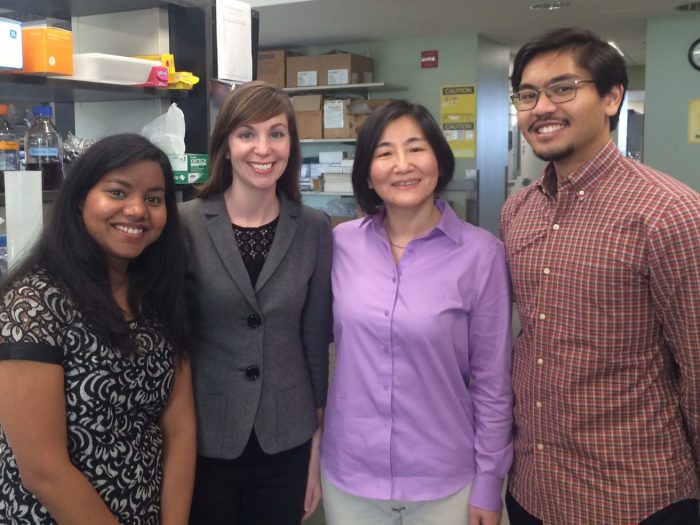Website: Darrah Lab Website
The major focus of our laboratory is to identify mechanisms which drive the development and propagation of autoimmune diseases, with an emphasis on biomarker discovery and translational application. Much of our work thus far has focused on the biochemical and immunologic properties of the calcium-dependent peptidylarginine deiminase (PAD) enzymes, key pathogenic enzymes in rheumatoid arthritis (RA). Through collaborative studies within the Johns Hopkins School of Medicine community and with national experts at other institutions, we have gained valuable insights into the basic biology of the PAD enzymes and their potential role in promoting disease in RA, both as key pathogenic enzymes and as autoantigens. In studies with Antony Rosen, M.D., we discovered a novel group of human anti-PAD4 antibodies that activate the PAD4 enzyme by lowering the amount of calcium necessary for catalysis. These enzyme-activating autoantibodies identify RA patients with the most erosive joint disease and highest risk for developing interstitial lung disease, especially in cigarette smokers, suggesting that they are powerful biomarkers that may also be directly pathogenic.
In parallel, we have explored the role of neo-epitopes in stimulating autoreactive T cells in patients with autoimmune diseases. We have recently shown that proteolysis of PAD4 by the serine protease granzyme B results in altered antigen processing and presentation of peptides capable of stimulating autoreactive T cells in patients with RA. In a collaborative study between the Division of Rheumatology and Sidney Kimmel Comprehensive Cancer Center, we demonstrated that immune responses specific to mutated proteins in cancer could spread to recognize germ-line encoded versions of these proteins and elicit immune responses associated with the systemic autoimmune disease Scleroderma.
These findings have sparked several exciting lines of investigation, including ongoing studies to determine the mechanistic interaction between cigarette smoking and PAD4-activating autoantibodies and a study to understand the potential of PAD4-activating autoantibodies to predict treatment response or failure in patients with RA. An ongoing interest of our lab is to understand how modification of autoantigens, be they mutations or post-translational events, alters the natural processing and presentation of peptides by human dendritic cells and how this process may be modulated by environmental factors. An emerging area of interest is to harness currently available high through-put technologies to understand how gender differences may explain the predominant female skewing of many autoimmune disorders. Through this work, we hope to identify underlying mechanisms responsible for the breach of tolerance to autoantigens and subsequent development of autoimmune diseases.

Selected Publications
- Darrah E, Giles JT, Ols ML, Bull HG, Andrade F, Rosen A. Erosive rheumatoid arthritis is associated with antibodies that activate PAD4 by increasing calcium sensitivity. Sci Transl Med. 2013 May 22;5(186):186ra65. PubMed PMID: 23698378; PubMed Central PMCID: PMC3740946.
- Joseph CG1, Darrah E, Shah AA, Skora AD, Casciola-Rosen LA, Wigley FM, Boin F, Fava A, Thoburn C, Kinde I, Jiao Y, Papadopoulos N, Kinzler KW, Vogelstein B, Rosen A. Association of the autoimmune disease scleroderma with an immunologic response to cancer. Science. 2014 Jan 10;343(6167):152-7. PubMed PMID: 24310608; PubMed Central PMCID: PMCID: PMC4038033
- Giles JT, Darrah E, Danoff S, Johnson C, Andrade F, Rosen A, Bathon JM. Association of crossreactive antibodies targeting peptidyl-arginine deiminase 3 and 4 with rheumatoid arthritis-associated interstitial lung disease. PLoS One. 2014;9(6):e98794. PubMed PMID: 24901704; PubMed Central PMCID: PMC4047055.
- Darrah E, Kim A, Zhang X, Boronina T, Cole RN, Fava A, Giles JT, Bingham III CO, Chalmers MJ, Griffin PR, Sadegh-Nasseri S, Rosen A. Proteolysis by Granzyme B Enhances Presentation of Autoantigenic Peptidylarginine Deiminase 4 Epitopes in Rheumatoid Arthritis. J Proteome Res. 2017 Jan 6;16(1):355-365. PubMed PMID: 27700100; PubMed Central PMCID: PMC5218978
Get the full list of publications by Dr. Darrah here.


